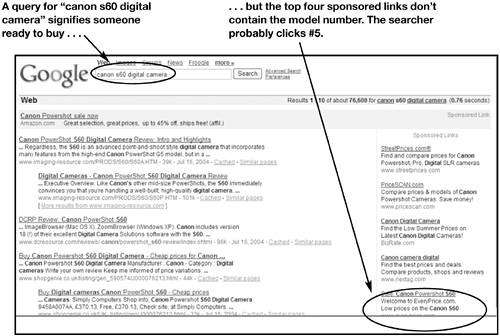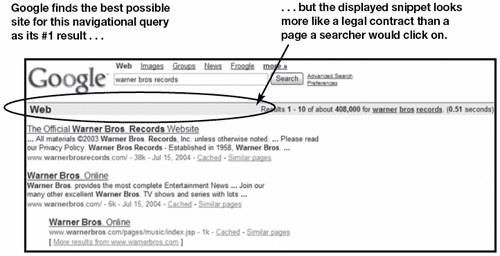The Searcher s Intent
The Searcher's IntentNow that you understand the basics of Web visitor behavior, let's talk specifically about search. Web searchers have behaviors all their own that start with the query itself. Throughout history, human beings have sought to bring order to information by sorting and grouping documents to find them when they need them. But the advent of computer information retrieval (that is, search) made possible a massive increase in the number of documents available to find the needed information. And mostly, that's good. The problem arises when we expect those poor human beings to know how to find information in a whole new way. Folks who are comfortable using library card catalogs, book indexes, and other paper techniques find that none of those skills translate into using Web search. So, although searchers are growing more sophisticated each year, the task of actually choosing the words for the query is one of the most difficult parts of searching. A few years ago, searchers mostly entered one- or two-word queries, and although queries are getting longer each year, it is still hard for search engines to know exactly what the searcher intends by a query. It's actually a simple question: What does the searcher really want when he enters a query? But the answer is hardly as simple. When a searcher enters "home improvement," is he remodeling his bathroom or interested in Tim Allen's TV show? Researchers from top search engines say one of their biggest frustrations is making sense of the searcher's query. Despite this, it is not a hopeless cause. You can dramatically improve your search marketing by thinking about the "need behind the query." This knowledge helps you deliver the best possible content to your visitors when they search. Andrei Broder, formerly of AltaVista (and current Distinguished Engineer at IBM), segments searchers into three categories:
We need to examine each kind of searcher so that you can reach them with content from your Web site. Understand that real people shift roles all the timethe same searcher might enter informational queries to learn about a new product and suddenly decide to use a transactional query to buy it. A clear understanding of the types of searchers and their respective intent will help you reach more searchers with less effort. Navigational SearchersNavigational searchers are looking for a specific Web site, perhaps because they have visited it in the past, or someone has told them about it, or because they have heard of a company and they just assume the site exists. Unlike other types of searchers, navigational searchers have just one right answer in mind. Table 4-1 shows some examples of navigational searches.
Even when they use the same query, navigational searchers might not have the same destination in mind, as Table 4-2 shows.
Although it might be ambiguous as to what the navigational searchers want, it is clear what they do not want. They do not want deep information from a Web sitethey want the home page. They know what site they want, and only that site will do. And, in most cases, they want just the home page for that siteno other pages.
Frequently, novice search marketers find navigational searchers the hardest to fathomthis type of search does not make any sense to them. "Why would someone go to a search engine to search for my company when the URL is our name?" they ask. But Table 4-3 reflects the popularity of navigational searches within the top 20 most frequently searched terms. As you look at the table, you will see that the top searches revolve around popular current events (Paris Hilton's TV show, the Spider-Man movie, the Tour de France, and so on), but just below you find a set of navigational queries, some of which are the same week after week.
If, by now, you are becoming convinced of the importance of navigational searchers to your search marketing efforts, you might be wondering what you can do to make sure those searchers find your site. Usually, you do not need to do much. Most navigational queries don't have a lot of competitionwhen someone enters the name of your company into Yahoo! Search, your Web site should show up. As Table 4-2 shows, if your company's name is shared by other companies, there might be some competition, but there is much less competition than for other kinds of queries. Most corporations should be in the top few results of most search engines for searches on their company name or their popular brand names. Take steps now to make sure your Web site ranks well for navigational queries:
Because people often use navigational queries to locate a company when they cannot figure out how to type the URL directly, you might also consider registering domains for common misspellings of your company name. That way, people might find your company without resorting to navigational searches at all. Informational SearchersInformational searchers want to find deep information about a specific subject. Informational searchers believe this deep information exists, but they don't know where it's located. Unlike navigational queries, informational queries do not have a single right answerthe best search results are several pages from multiple sites that all shed some light on the subject. Almost every Web user is an informational searcher at one time or another. Most searchers start with a simple query, refining it until they locate good answers (or give up). The intent of informational searchers proves the most difficult to deduce because their queries can mean so many things. Many informational searchers enter only a single phrase, such as "new york." Whether that searcher meant New York City or the State of New York, and whether she wants to visit New York or learn about its history, discerning her intent is next to impossible.
The informational searcher is the mainstay of any search marketing program. Informational searchers have not yet chosen the product they want to buy (for example), so they are still "up for grabs." Informational searchers allow you to present your products before they have chosen a specific product. The key to satisfying informational searchers is to provide clear "learn about" content related to your products or services. If you are selling riding lawnmowers, explain why riding lawnmowers are superior to the hand-push kind. If you offer a smoking-cessation program, why does yours work while others fail? No matter what your Web site sells, why is yours better? Whatever your Web site does, why do you do it better? By researching the informational queries that searchers use (explained in detail in Chapter 11, "Choose Your Target Keywords"), and by optimizing your pages to meet those information needs (covered in Chapter 12, "Optimize Your Content"), you can attract informational searchers to your site. Transactional SearchersTransactional searchers make things happen. They are not looking for informationthey want to do something. Transactional queries cluster around specific tasks, such as buying products, accessing databases, and downloading various types of files (images, software, or songs). When searchers enter the name of a book, or the model number of a digital camera, they are intending to make a transaction, namely to buy the item. But there are many other kinds of transactional queries. Anyone trying to download a fix for a computer, or signing up for a newsletter, or donating to a charity is a transactional searcher. Transactional queries are the hardest of all queries to incorporate into an optimization program. Transactional queries are often related to specific products, and should return product catalog pages, which unfortunately have little content on them and do not rank well in search engines. The text-rich informational searcher pages that solved shoppers' problems with your products are gone, replaced by barren catalog pages with model numbers, specifications, and a picture. It is hard work to dress up these catalog pages for search engines. The most important goal for improving these catalog pages is to make the search result's snippet relevant to the query. You improve your chances of both being found by the search engine and being clicked by the searcher by incorporating the query's words into the title and other parts of the page. In addition, you should feature any special pricing or other offer prominently on the page to catch the attention of the searcher. If your page can reassure searchers that it is a good choice, even better. Figure 4-3 demonstrates why paid placement advertisements are not always clicked by searchers. Clearly the searcher is looking for a specific model of camera, yet all but the fifth result fail to incorporate the camera model into the offer. The other paid results might cause searchers to have to start from scratch and enter the model number all over again once they get to the Web site, a sure way to turn off searchers. Figure 4-3. Enticing transactional searchers to click. Transactional searchers expect to see what they typed in your offer, or they might not click. | |||||||||||||||||||||||||||||||||||||||||||||||||||||||||||||||||||||||||||||||||||||||||||||||||||||||||
EAN: 2147483647
Pages: 138

